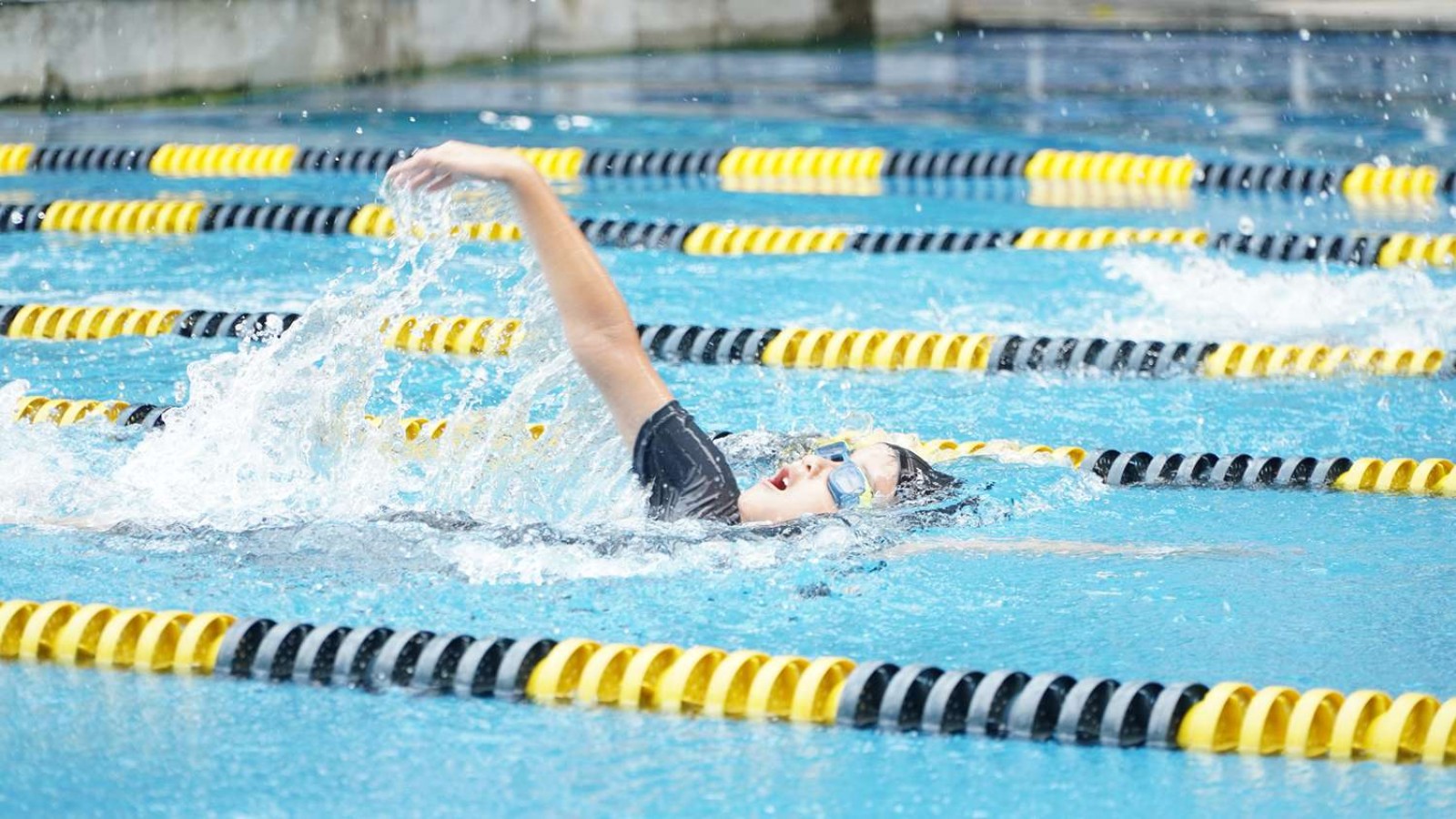Swimming Workout For All Levels: To Improve Your Skills
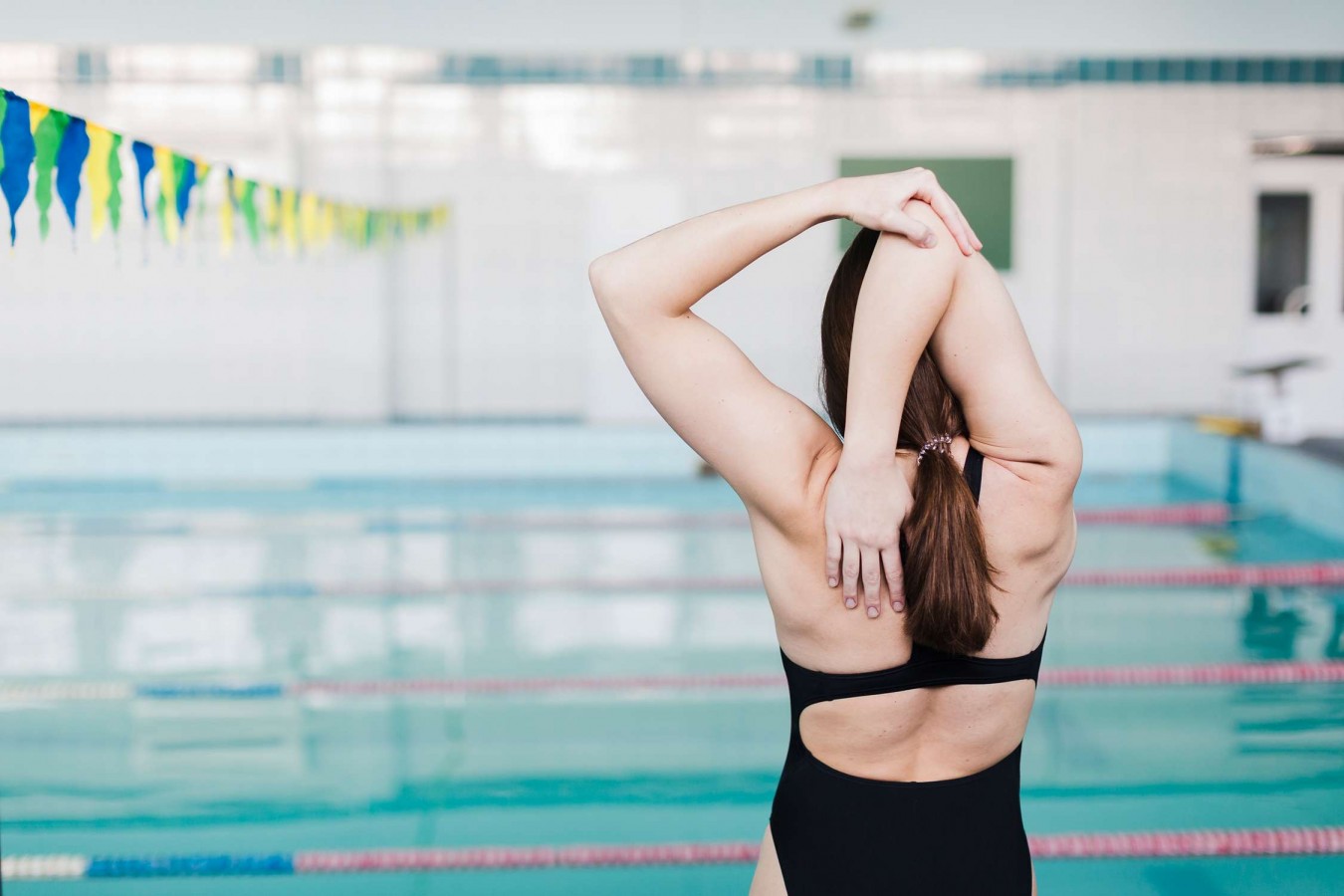
Swimming is a full-body workout that not only enhances cardiovascular fitness but also improves strength and speed. Whether you're a beginner dipping your toes into the water or an experienced swimmer looking to enhance your performance, these 10 swimming workouts cater to all levels.
Each workout targets specific muscle groups and contributes to overall fitness. Let's dive into the details of each exercise, including step-by-step instructions and the goals they aim to achieve.
The Benefits of Swimming Workout
Swimming is one of the best full-body workouts you can do. The great part is, it’s gentle on your body while still being super effective. Unlike exercises like running or heavy lifting at the gym, swimming doesn’t put as much stress on your joints. That means it’s a great option if you have joint issues or you’re looking for a lower-impact way to stay active. The water supports your body, so you can move freely while still getting an intense workout.
When you swim, you’re using almost every major muscle group in your body. Each stroke involves kicking, pulling, and pushing, which works out your arms, shoulders, glutes, and legs all at once. It’s like doing resistance training but in the water. Plus, swimming is amazing for your core muscles (your abs and lower back), which help keep you balanced and strong, both in the pool and in daily life.
Another great benefit of swimming is how it improves your heart health and overall fitness. Because it’s a cardiovascular activity, swimming gets your heart pumping, which helps boost your endurance and can even lower your risk of heart disease over time. The more you swim, the better your technique and timing become, and the more fun it gets! Following a swim program can help you track progress, stay motivated, and enjoy your time in the water even more.
Formal vs Informal Swim Education: Why Both Matter
When it comes to teaching children how to swim, there are two main approaches: formal swim education (structured lessons with certified instructors) and informal water play (unstructured, playful exploration). On the surface, they may seem very different, but in reality, the two complement each other beautifully. Here's what differ them:
A. Formal Swim Education
Formal swim education is what most parents picture when they think of swim lessons. These are structured sessions led by trained instructors who follow child-centered teaching methodologies.
Key strengths of formal swim education include:
- Consistency and measurable progress: Lessons are tailored to different age groups, ensuring children learn skills appropriate for their stage of development.
- Certified expertise: Instructors bring professional training, safety knowledge, and patience to the process, giving children the guidance they need.
- Clear milestones: Whether it’s mastering floating, breathing techniques, or basic strokes, children benefit from having defined goals and a sense of achievement.
Children, especially in their formative years, thrive when they are guided with structure, patience, and progression. In this environment, they’re developing discipline, resilience, and the ability to build on small successes step by step.
B. Informal Swimming Play
On the other end of the spectrum lies informal swim education that often feel less like learning and more like “fun.” But don’t underestimate its power.
Informal water play allows children to:
- Explore at their own pace: No pressure, no expectations—just freedom to splash, float, and discover.
- Build confidence naturally: By interacting with water in a playful way, kids form positive associations, reducing fear and increasing comfort.
- Develop life skills: Unstructured play enhances problem-solving, creativity, and even risk assessment as children learn how their bodies interact with water.
- Bond with caregivers: Whether it’s playing in a shallow pool or experimenting with water tables at home, this time spent together creates trust and security.
Parents who supervise safe water play often notice how quickly their children grow more adventurous and curious, making them more receptive to formal lessons later on.
10 Swimming Workout You Have To Try
Many beginners aspire to enhance their swimming skills, recognizing the numerous health benefits and the joy of mastering this essential life skill. However, navigating the vast pool of swimming workouts can be daunting for those just starting. Without proper guidance, beginners might struggle to structure an effective routine that caters to their skill level and goals.
To challenge and improve your swimming abilities, here are several variations of swimming workout you can try:
1. Freestyle Sprints
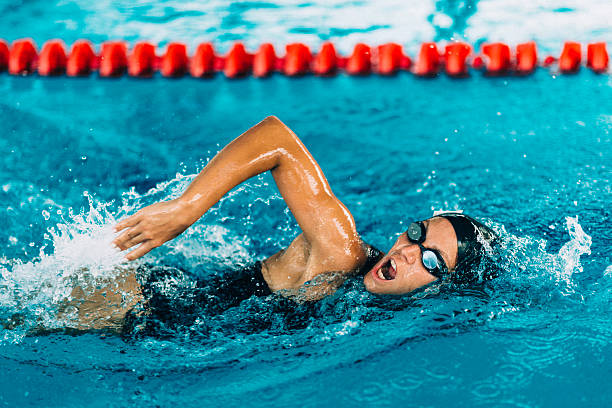
The goal of this exercise is multifaceted, aiming to enhance cardiovascular fitness, improve anaerobic capacity, and boost overall swimming speed. By engaging in short bursts of maximum-effort freestyle swimming, swimmers challenge their cardiovascular system, promoting increased endurance over time.
Steps:
- Warm-up with easy laps.
- Sprint one lap at maximum effort.
- Recover with a slow-paced lap.
- Repeat for 5-10 sets.
2. Kickboard Kicks
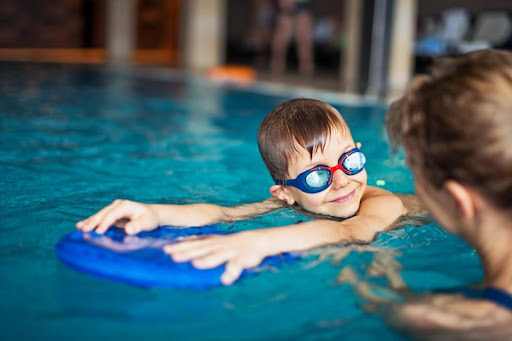
Kickboard kicks are strategically designed to target the lower body muscles, with a primary focus on the quadriceps. The overarching goal of this exercise is to systematically strengthen the leg muscles, providing a dedicated platform for enhancing kicking power and overall leg endurance.
Steps:
- Hold a kickboard in front of you.
- Keep your body horizontal and kick your legs.
- Perform 4 sets of 50 meters each.
3. Pulling Drills
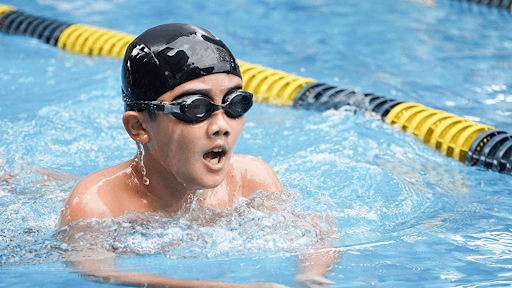
Pulling drills place a concentrated focus on building upper body strength. The primary objective of this workout is to systematically develop the muscles of the upper body, with a particular emphasis on the shoulders and back.
By engaging in pulling drills, swimmers target key muscle groups essential for efficient stroke mechanics. The repetitive and intentional movements during this exercise contribute to the strengthening of the shoulders and back, promoting not only increased power but also enhanced endurance in these critical areas.
Steps:
- Use a pull buoy between your thighs.
- Swim using only your arms.
- Aim for 4 sets of 100 meters each.
4. Interval Training
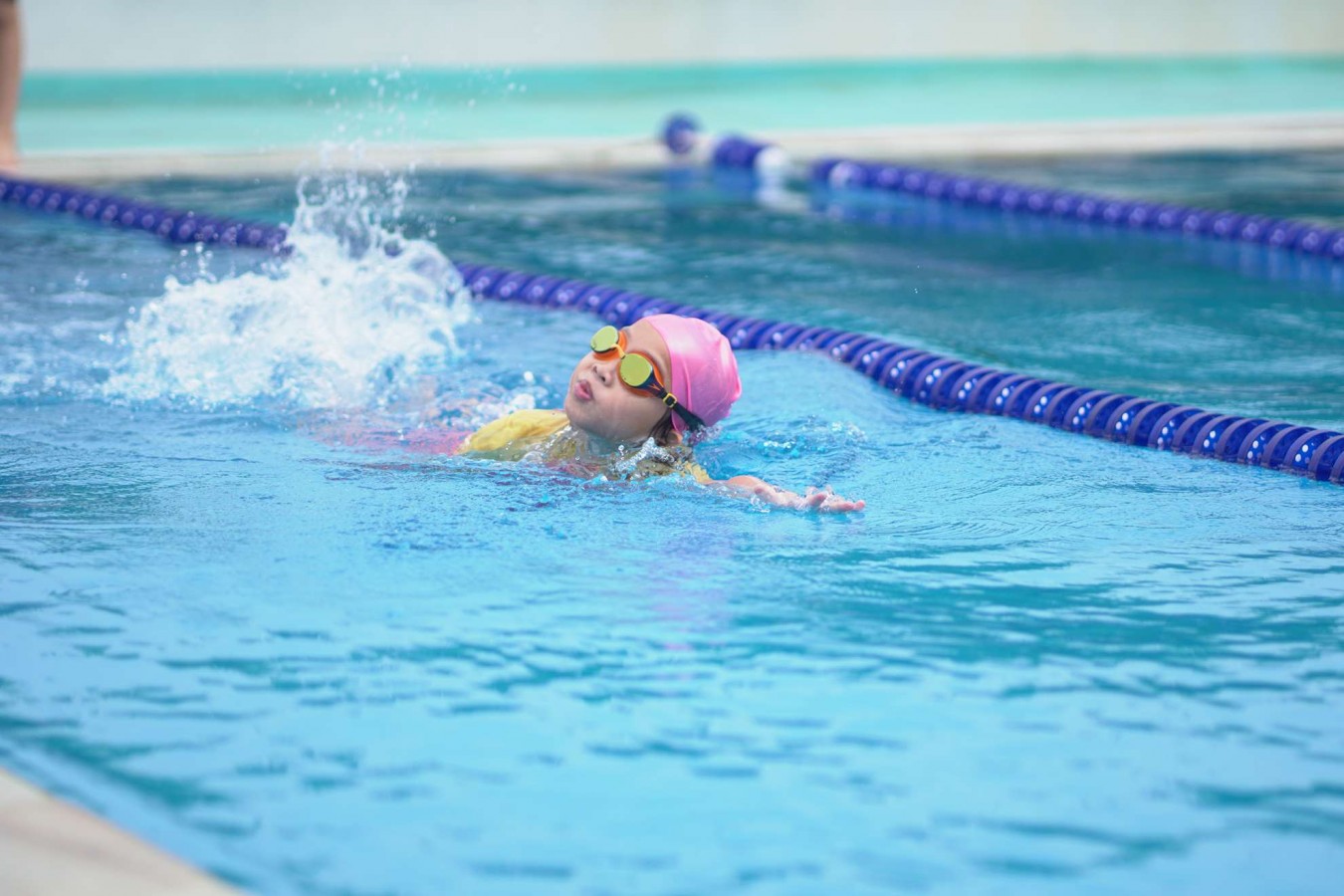
This workout involves alternating between high-intensity and low-intensity periods, with the goal of boosting cardiovascular fitness, enhancing speed, and improving recovery between intense efforts.
Steps:
- Swim at maximum effort for 1 minute.
- Recover with a slow-paced swim for 2 minutes.
- Repeat for 5 cycles.
5. Breaststroke Pull Outs
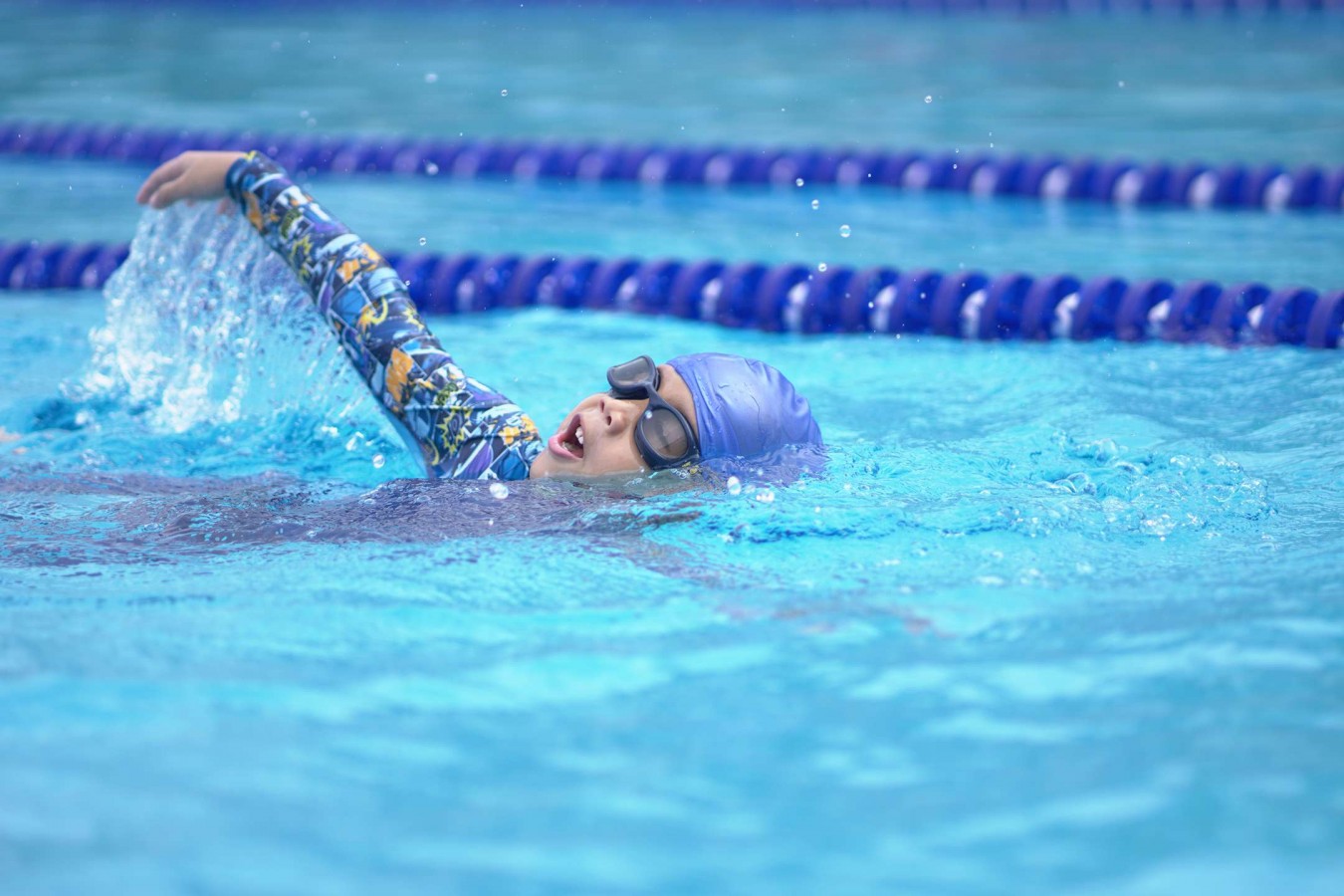
Breaststroke Pull Outs emphasizes powerful arm movements in the breaststroke, with the goal of strengthening arm muscles, improving pullout efficiency, and enhancing overall breaststroke technique.
Steps:
- Execute a breaststroke pullout with maximum force.
- Perform 8-10 sets of 25 meters.
6. Pyramid Sets
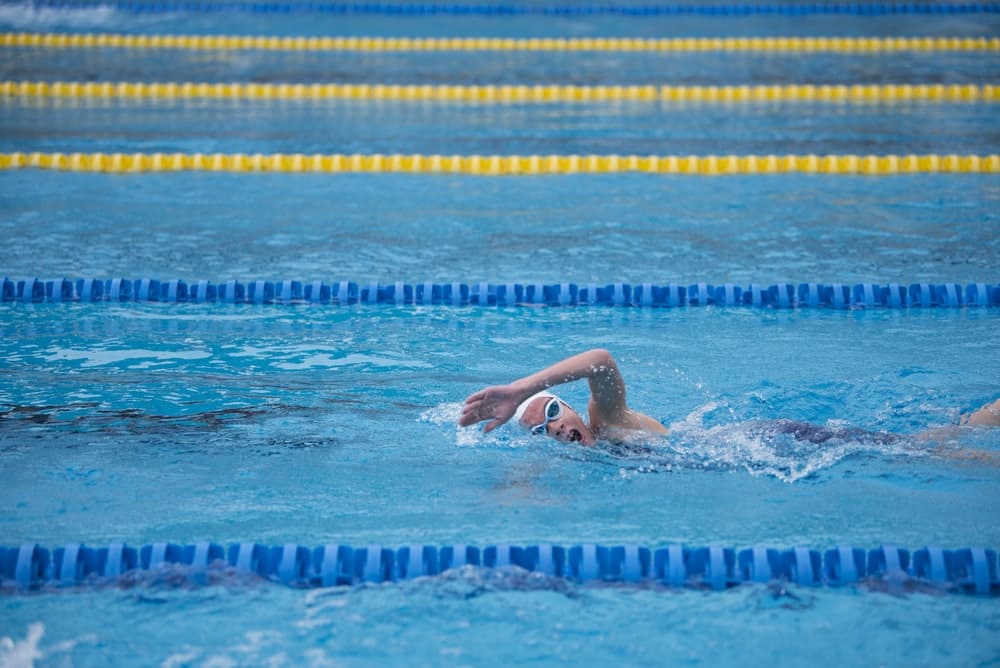
This workout involves gradually increasing and then decreasing the intensity, with the goal of building both aerobic and anaerobic capacity, thereby enhancing overall swimming endurance.
Steps:
- Start with a 50-meter sprint.
- Increase to 100 meters, then 150 meters.
- Decrease back to 100 meters and finish with a 50-meter sprint.
7. Underwater Kicking
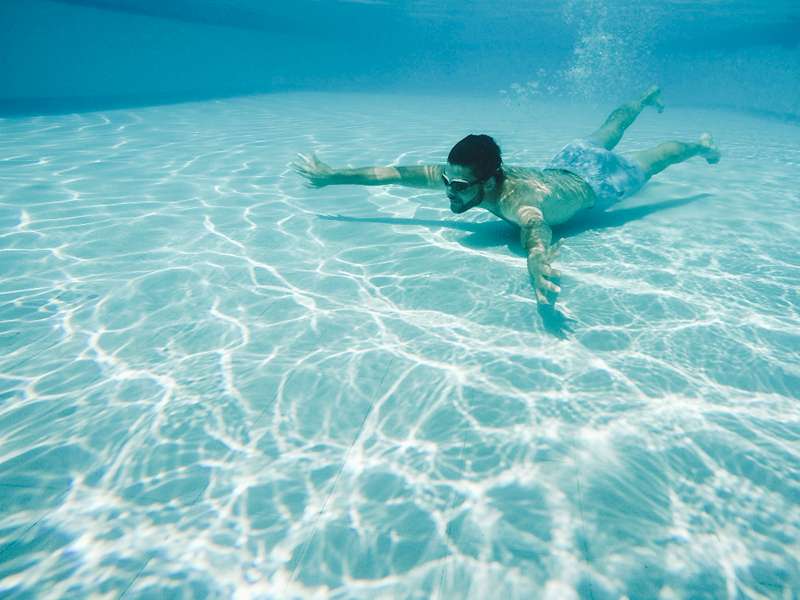
The exercise aims to improve leg strength and lung capacity, with the goal of strengthening leg muscles, enhancing streamline position, and improving breath control.
Steps:
- Push off the wall and kick underwater.
- Aim for 4 sets of 25 meters each.
8. Medley Mix-Up
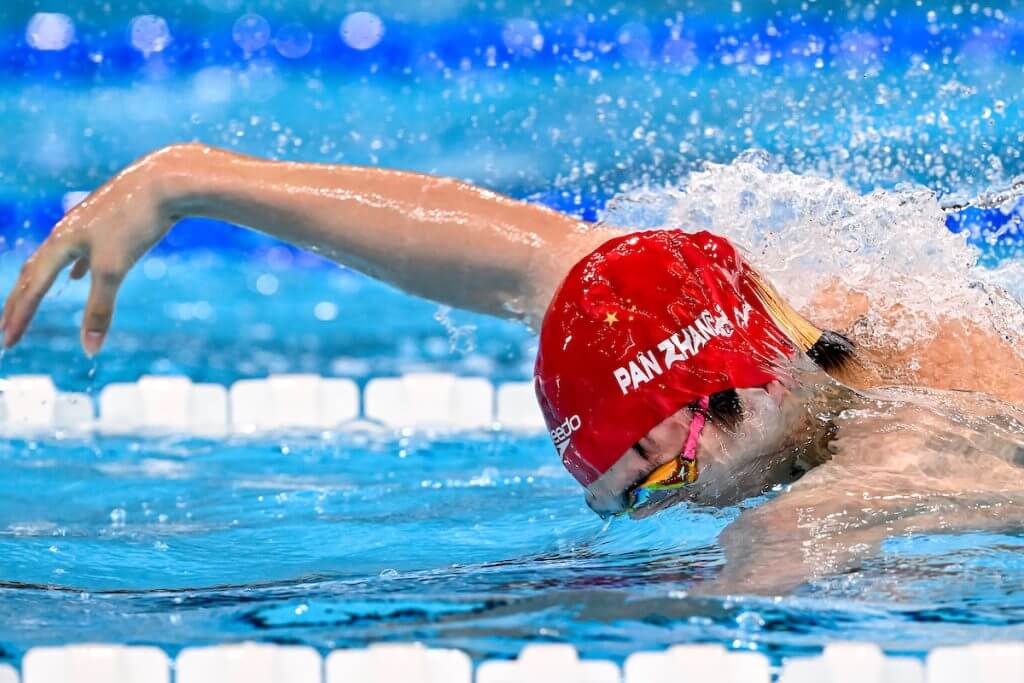
The workout involves swimming different strokes in a single set, with the goal of enhancing overall swimming versatility, working multiple muscle groups, and improving stroke transitions.
Steps:
- Combine freestyle, backstroke, breaststroke, and butterfly in one set.
- Repeat for 5 sets of 100 meters each.
9. High-Intensity Butterfly
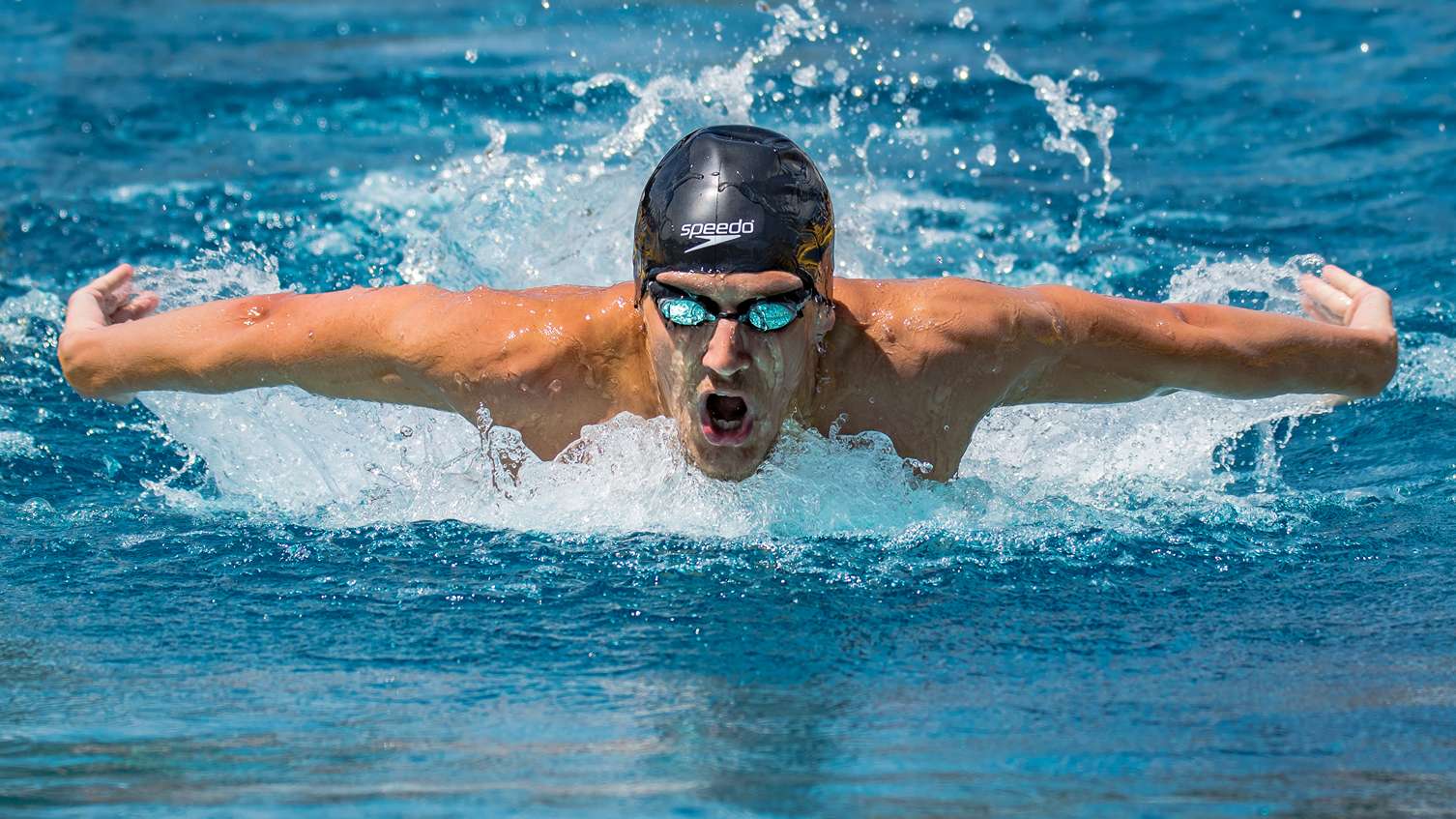
This exercise intensifies the butterfly stroke for maximum power, with the goal of building strength in the chest, shoulders, and core, thereby improving overall butterfly stroke performance.
Steps:
- Swim 25 meters using powerful butterfly strokes.
- Recover with an easy 50-meter swim.
- Repeat for 8-10 sets.
10. Cool Down with Distance
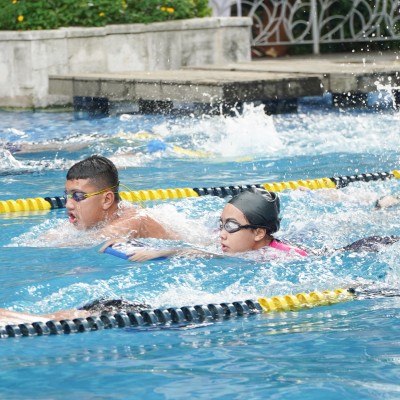
This workout is to finish your workout with a longer, steady-paced swim to cool down, with the goal of promoting recovery, helping flush out lactic acid, and improving overall swimming endurance.
Steps:
- Swim at a comfortable pace for 500 meters.
- Focus on long, efficient strokes.
Swimming Workout Set For Beginner
Many beginners embarking on their swimming journey often seek structured workout sets tailored to their skill level. Recognizing the importance of easing into a new aquatic fitness routine, it's crucial to find a balance between challenge and attainability.
Here the provided recommendation serves as a versatile starting point suitable for all levels of swimmers:
1. Beginner 30-Minute Distance Workout
For those less accustomed to swimming extended distances yet find themselves adept in the water, this exercise routine is tailored to your needs. It proposes straightforward freestyle and kicking intervals aimed at gradually improving your swimming endurance.
- 8 x 50 yards fast kick with 20 seconds rest in between laps
- 4 x 25 yards freestyle with 15 seconds rest in between laps
- 4 x 25 yards freestyle with 15 seconds rest in between laps
- 1 min rest
- 6 x 100 yards alternating easy freestyle (odds) and hard freestyle (evens) with 30 seconds rest
- 4 x 25 yards freestyle with 15 seconds rest in between laps
- 4 x 25 yards freestyle with 15 seconds rest
2. The Water Familiarization Workout
Crafted by Cameron Martinez, a personal trainer and swim instructor at New York Health and Racquet Club, this workout is designed for those gradually acclimating to swimming.
Rather than focusing extensively on refining strokes, the aim is to familiarize individuals with manageable distances, allowing them to grow comfortable in the water before intensifying their efforts.
- 8 x 25 yards flutter kick with board with 15 seconds rest
- 8 x 25 yards alternate sprint kicksand easy kicks with 10 seconds rest in between laps
- 4 x 50 yards alternate laps of freestyle and backstroke with 20 seconds rest
- 60 seconds rest
- 8 x 25 yards freestyle with 15 seconds rest in between laps
- 8 x 25 yards alternating sprint freestyle and easy backstroke with 10 seconds rest in between laps
- 4 x 50 yards freestyle with 20 seconds rest in between laps
Tips for Better Swimming Workouts
If you want to make the most out of your time in the pool, it’s not just about swimming more — it’s about swimming smarter. Whether you're just starting or have been swimming for years, these tips can help you swim better, faster, and with more enjoyment.
1. Prioritize Good Technique
Swimming is all about moving smoothly through water and that means reducing resistance. One of the best ways to do this is by keeping your hips high, which helps your body stay flat and streamlined in the water. Think of yourself like a torpedo gliding forward. Also, try to maximize each stroke by reaching forward and pulling with purpose. A great habit is to count how many strokes it takes you to complete each lap. Fewer strokes often means better efficiency. By focusing on your technique, you’ll swim smarter, not just harder.
2. Measure What Matters to You
Everyone swims for different reasons. Some want to burn calories, others are training for a race, and some just want to get fitter. No matter your goal, tracking your progress makes a big difference. Tools like waterproof fitness trackers, swim watches, and even smart goggles with digital displays can help you monitor things like heart rate, lap count, or how fast you’re going. When you keep track of the right data, it’s easier to stay focused and motivated.
3. Train Your Core Outside the Pool
Your core muscles play a huge role in swimming. A strong core helps you stay stable and balanced in the water, which means you can swim faster and more efficiently. Plus, core training can give you a boost in starts, turns, and your ability to stretch out each stroke. Adding exercises like planks, leg raises, or Russian twists to your routine will make a noticeable difference in your swimming performance and help protect you from injuries.
4. Swim Often to Build “Feel for the Water”
There’s a special kind of rhythm and connection swimmers develop with the water — often called “feel for the water.” It’s that sensation of being able to grip the water and pull yourself forward more powerfully. The more consistently you swim, the stronger that feel becomes. Even a few days away from the pool can cause it to fade, so aim for regular sessions each week to keep improving and feeling great in the water.
5. Break Up Your Workouts
Instead of just swimming non-stop for 30–40 minutes like you might run on a treadmill, try breaking your swim into smaller sets or intervals. For example, swim 4 laps hard, then rest, repeat with a drill or technique set. This not only helps improve your overall speed and endurance, but also keeps things interesting and helps you stay focused on your form. Intervals challenge your body in different ways, boosting your metabolism and helping you get stronger, faster.
Conclusion
Swimming workouts cater to individuals of all levels, providing a comprehensive approach to improve strength and speed. Incorporating these swimming workouts into your children's routine can pave the way for a myriad of benefits, ranging from physical fitness to enhanced cognitive development.
As we navigate the waters of fostering a healthy lifestyle for our little ones, consider enrolling them in a structured swimming program. Rockstar Academy stands out as the premier Sports & Performing Arts Academy, offering a diverse range of programs tailored to meet your child's unique needs.
At Rockstar Academy, the swimming program stands as a pinnacle of excellence, boasting the finest curriculum designed to hone the skills of aspiring swimmers. Enrolling your children in this program not only guarantees top-tier coaching but also presents an opportunity to participate in RockOlympics.
RockOlympics is the prestigious and largest competitive event in the academy. With over 100 diverse individual and team competitions across 13 programs, RockOlympics becomes the stage where kids and teens from Rockstar Academy can challenge themselves, surpass their boundaries, and relish the fruits of their dedication and hard work.
With a commitment to excellence, Rockstar Academy not only provides top-notch training but also invites you to experience their exceptional offerings with a free trial class. Take the plunge into a world of holistic development for your children by contacting Rockstar Academy today!
FAQs
How often should I incorporate these swimming workouts into my routine?
Aim for at least three swimming sessions per week, incorporating a variety of these workouts for optimal results.
Can beginners attempt these swimming exercises?
Yes, beginners can start with modified versions and gradually increase intensity as they become more comfortable in the water.
Is it necessary to warm up before a swimming workout?
Yes, warming up is crucial to prevent injuries. Start with easy laps and gradually increase the intensity.
How do I know if I am overtraining?
Pay attention to your body. If you experience excessive fatigue, muscle soreness, or a decline in performance, consider taking a rest day or reducing the intensity.
